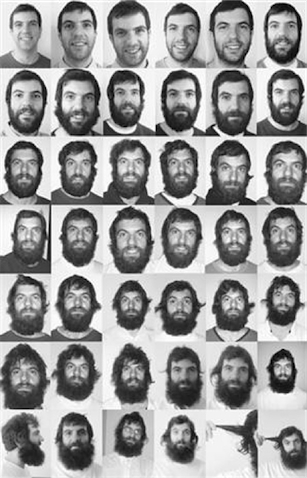A Year of Following All the Rules in the Bible
As a devout Christian I find the experiment in this new book, The Year of Living Biblically, fascinating. The guy who wrote The Know-It-All, a book about reading the entire Encyclopedia, recently spent a year trying to follow all 700 plus rules he found in the Bible. These rules ranged from the obvious Ten Commandments to the more obscure details of Old Testament laws, which ultra orthodox Jews might follow: leaving side hair uncut, dwelling in huts on certain holidays, strict dietary routines. To give some idea of the physical transformation he underwent, the book offers this photo.

There’s a amusing interview with him at Newsweek online, that points to a couple of important things about anyone trying to literally (fundamentally) obey the many rules found in this very long book.
Q: Many women say some passages in the Bible can seem pretty misogynistic. Was that a problem for your relationship?
A: It was. Parts of the Bible say that the man is the head of the household and should make the decisions, which did not translate into reality in our household. She found that a disturbing part of religion. It was something I really had to wrestle with. One of the lessons of the book is, there is some picking and choosing in following the Bible, and I think that’s OK. Some people call that cafeteria religion, which is supposed to be a disparaging term, but I think there’s nothing wrong with cafeterias, I’ve had some delicious meals in cafeterias. I’ve also had some terrible meals in cafeterias. It’s all about picking the right parts. You want to take a heaping serving of the parts about compassion, mercy and gratefulness — instead of the parts about hatred and intolerance.
That has been my experience with both practicing religion and hanging around others practicing it in various degrees, including many who do it wholeheartedly. Everybody is picking and choosing parts they take literally and parts that they take metaphorically, but some admit this and others don’t. Or rather some believe the distinction is obvious and necessary rather than arbitrary or personal. However the fact that very few people — even those who are the most fundamental in any religion — agree on which rules are fundamental is evidence of the personal nature of the decision.
Q: Once the experiment ends, you write about being feeling unanchored without your list of rules. Were you comforted by the restrictions of living Biblically? And do you think that’s part of the attraction of organized religion for many people?
A: Oh, absolutely. We all talk about freedom of choice, but there’s something very attractive about freedom from choice. Religion provides structure, mooring, anchoring. Should you covet? No. Should you give 10 percent to the needy? Yes. It really structures your life. After my year I felt unmoored, overwhelmed by choice. I have adjusted, but I’m still overwhelmed by choice, as we all are in America.
This too is profound. Many soldiers leaving the army (especially in peacetime) bemoan the loss of structure a well-regulated army life gave them. There is no doubt this escape from what Barry Schwartz, in his book The Paradox of Choice, calls “the tyranny of choice” is a large attraction of religion. It’s joy should not be scoffed at. For instance I find that implementing a strict Never Lie rule in my own life has freed me up from having to weigh the plus and minuses of whether to do so, or keep track of what I said, or manage the blowback from when a ruse slips. Lying is not an option, so I am released from that struggle.
Q: Are you a more religious person as a result of this experiment?
A: Well, I don’t want to give away the ending, but let’s say I started the year as an agnostic, and now I am a reverent agnostic. Whether or not there is a God, I believe in sacredness. Rituals can be sacred, the Sabbath can be sacred however you choose to observe it.
My take on Burning Man, which I have attended about 10 times, is that it is 50% about supplying a ritual for the non-religious.
Q: Which is the greater learning tool, the Bible or the encyclopedia?
A: That’s a tough question. The Bible project was a lot more difficult than the encyclopedia project. The Bible affected every single part of my life, it affected the way I walked, the way I dressed, the way I hugged my wife, the way I ate. The year was the most extreme makeover of my life. In terms of which is the better learning tool, the encyclopedia does contain a lot of biblical passages in the different books, so it might contain most of the Bible in it.
Q: It’s been a little over a year since your experiment ended and you shaved your beard. How’s the life of sin?
A: It’s all right. I miss my sin-free life, but I guess I was never sin free. I was able to cut down on my coveting maybe 40 percent, but I was still a coveter. Flat-screen TVs, the front yard of my friend in the suburbs, a better cell phone, higher Amazon rankings.


